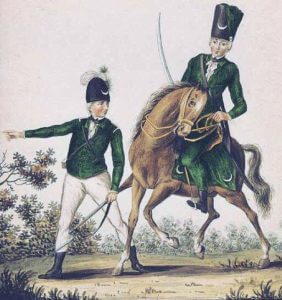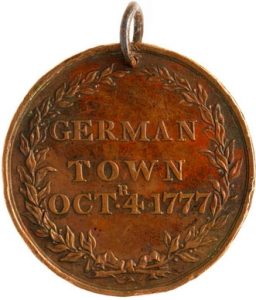General George Washington’s unsuccessful attempt on 4th October 1777 to retake Philadelphia; the battle that helped convince the French and Spanish the American cause was worth supporting against Britain

General George Washington conducting the American Attack on the Chew House at the Battle of Germantown on 4th October 1777 in the American Revolutionary War: picture by Alonzo Chapell
The previous battle of the American Revolutionary War is the Battle of Paoli
The next battle of the American Revolutionary War is the Battle of Saratoga
To the American Revolutionary War index
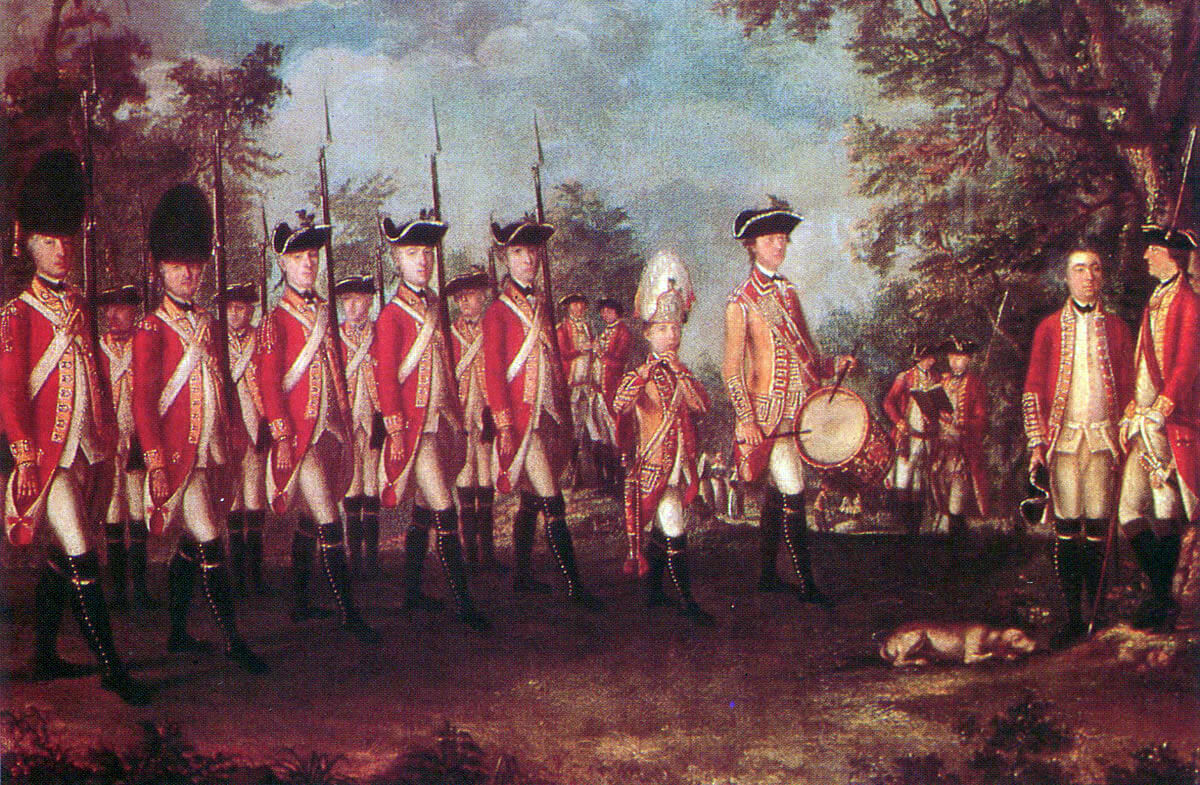
British 25th Regiment of Foot: Battle of Germantown on 4th October 1777 in the American Revolutionary War

Major-General Nathaniel Greene: Battle of Germantown on 4th October 1777 in the American Revolutionary War
Battle: Germantown
War: American Revolution
Date of the Battle of Germantown: 4th October 1777
Place of the Battle of Germantown: North of Philadelphia, Pennsylvania in the United States of America.
Combatants at the Battle of Germantown: The American Continental Army against the British and Hessian forces
Generals at the Battle of Germantown: General George Washington against Major-General Sir William Howe
Size of the armies at the Battle of Germantown: 11,000 Americans against 8,000 British and Hessians.
Uniforms, arms and equipment at the Battle of Germantown:
The British wore red coats, with bearskin caps for the grenadiers, tricorne hats for the battalion companies and caps for the light infantry. The Highland Scots troops wore the kilt and feather bonnet.
The two regiments of light dragoons serving in America, the 16th and 17th, wore red coats and crested leather helmets.

Grenadier of the British 40th Regiment of Foot: Battle of Germantown on 4th October 1777 in the American Revolutionary War
The Hessian infantry wore blue coats and retained the Prussian style grenadier mitre cap with brass front plate.
The Americans dressed as best they could. Increasingly as the war progressed infantry regiments of the Continental Army mostly took to wearing blue or brown uniform coats. The American militia continued in rough clothing.
Both sides were armed with muskets. The British and German infantry carried bayonets, which were in short supply among the American troops. Many men in the Pennsylvania and Virginia regiments carried rifled weapons, as did other backwoodsmen. Both sides were supported by artillery.
Winner: The British won the battle, but failed to follow up the success, permitting Washington to withdraw and reform his army behind fortified positions.
British Regiments at the Battle of Germantown: The British Regiments that can be identified at the battle are: Light Dragoons (not clear which regiment 16th or 17th), two composite battalions of grenadiers, two composite battalions of light infantry, two composite battalions of Foot Guards (1st, 2nd and 3rd Guards), 5th Foot, 25th Foot, 27th Foot, 40th Foot and 55th Foot.
American Units at the Battle of Germantown:
Colonel Bland’s 1st Dragoons, Wayne’s Pennsylvania Brigade, Weeden’s Virginia Brigade, Muhlenburg’s Virginia Brigade, Maxwell’s Light Infantry, Stephen’s Division, Stirling’s Division, Pennsylvania Militia, Maryland Militia and New Jersey Militia.
Background to the Battle of Germantown:
Following the British capture of Philadelphia after the Battle of Brandywine, Howe’s troops encamped in Germantown to the North of the city. The camp stretched in a line astride the main northern road.
Washington determined to surprise the British army in camp. His plan required a strong column under Major-General Nathaniel Greene, with McDougall, Muhlenberg, Stephen and Scott, to attack the right wing of the British army, which comprised Grant’s and Donop’s troops. The second column, which Washington commanded, with Stirling and Sullivan, would advance down the main Philadelphia road and attack the British centre. Forces of American militia would attack each wing of the British force, formed of the Queen’s Rangers on the right, and, on the left near the Schuylkill River, Hessian Jägers and British Light Infantry.
Washington’s plan required the four attacks to be launched “precisely at 5 o’clock with charged bayonets and without firing”. The intention was to surprise the whole British army in much the way the Hessians had been surprised at Trenton.
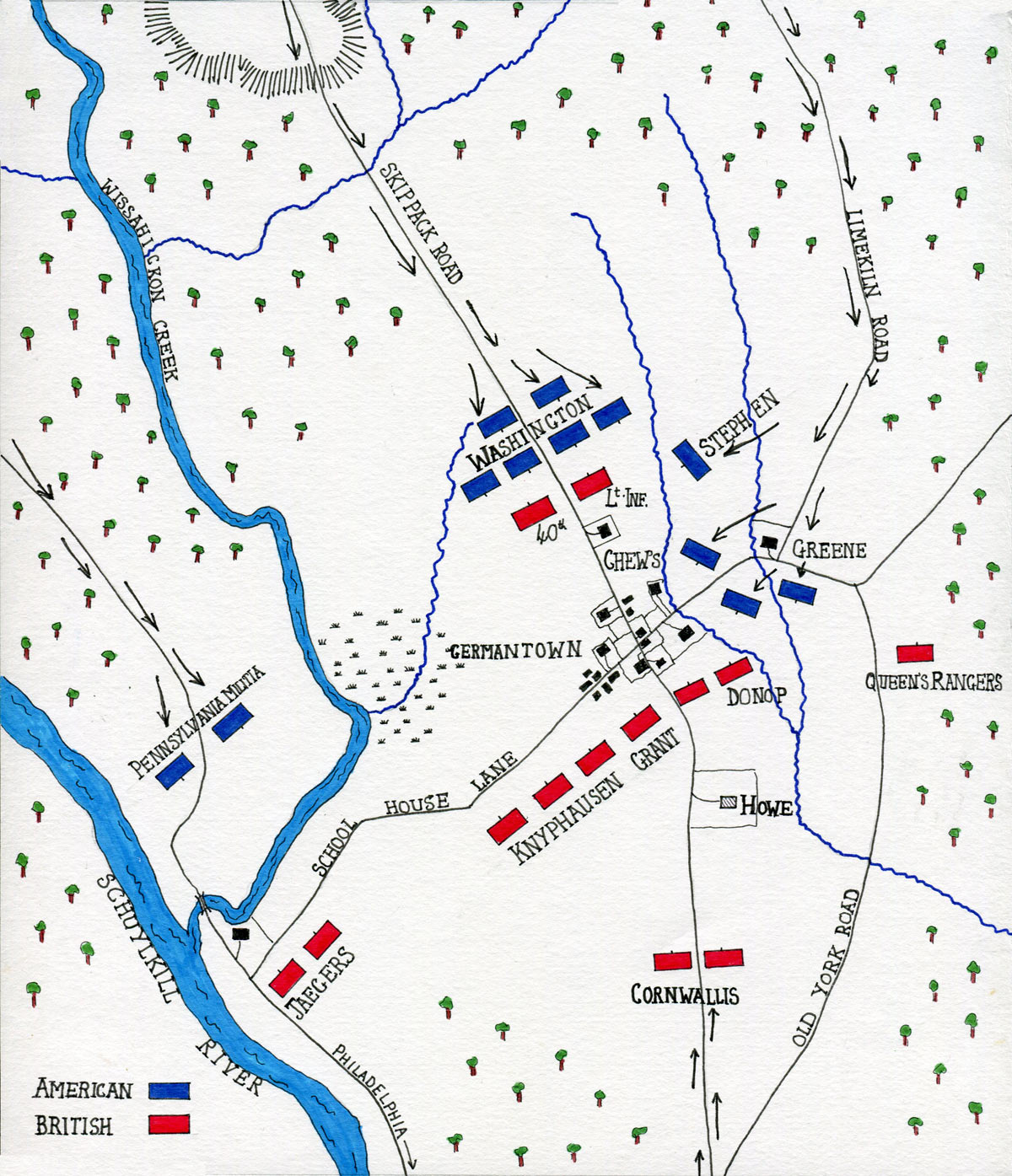
Map of the Battle of Germantown on 4th October 1777 in the American Revolutionary War: map by John Fawkes
Account of the Battle of Germantown:

Lieutenant-Colonel Sir Thomas Musgrave commanding 40th Foot at the Battle of Germantown on 4th October 1777 in the American Revolutionary War
The American columns started along their respective approach roads on the evening of 3rd October 1777. Dawn found the American forces well short of their start line for the attack, and there was an encounter with the first British piquet which fired its guns to warn of the attack. The outpost was supported by a battalion of light infantry and the 40th Foot, under Lieutenant-Colonel Sir Thomas Musgrave. It took a substantial part of Sullivan’s division to drive back the British contingent.
General Howe rode forward, initially thinking the advanced force was being attacked by a raiding party, his view impeded by a thickening fog that clouded the field for the rest of the day.
During the fighting, Musgrave caused six companies of the 40th to fortify the substantial stone house of Chief Justice Chew, Cliveden House situated on the main road, and use it as a strong point. The American advance halted, while furious attacks were launched against the house, aided by an American artillery barrage.
Hearing the firing, Major-General Adam Stephen, heading the other main American column, ignored his orders to continue along the lane to attack the British right wing, swung to his right and made for the Chew House. His brigade joined the attack on the house, which was assailed for a full hour by the infantry and guns of several American brigades.
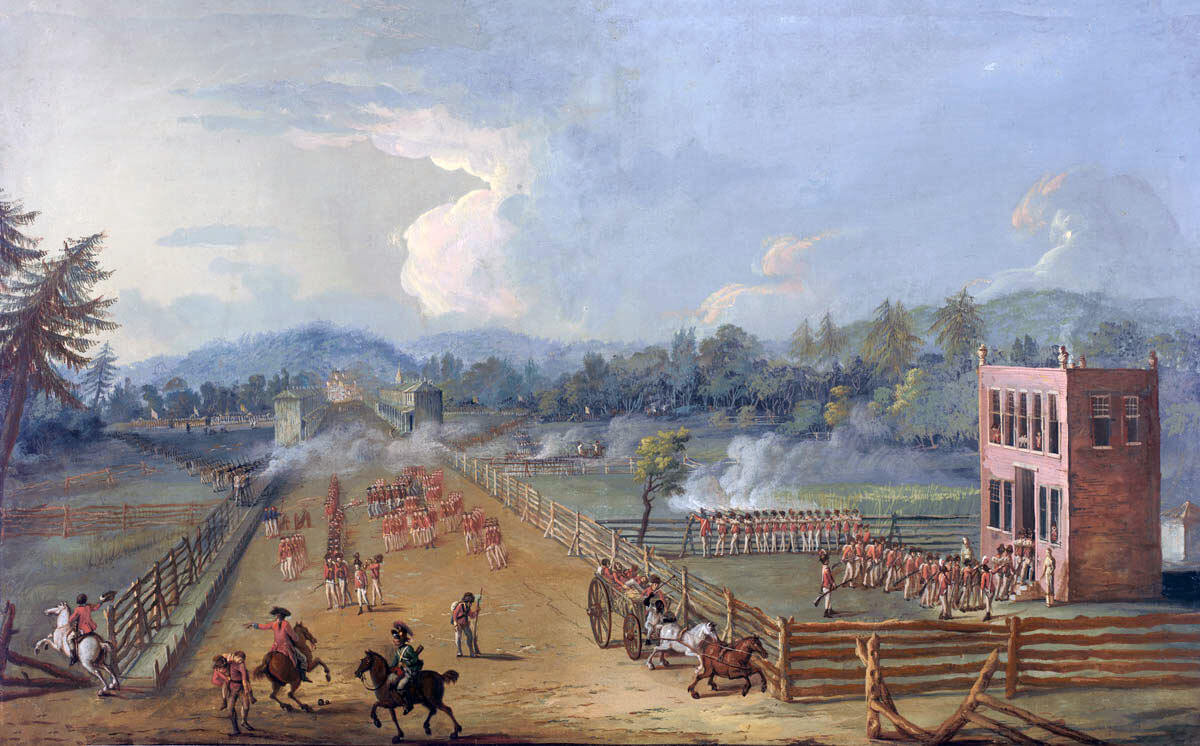
British 40th Foot occupying the Chew House at the Battle of Germantown on 4th October 1777 in the American Revolutionary War: picture by Xavier della Gatta
The rest of Greene’s division launched a savage attack on the British line as planned and broke through, capturing several British troops.
In the meantime, Sullivan and Wayne continued past the Chew House and began their attack. In the fog, Wayne’s brigade encountered Stephen’s brigade and the two American brigades exchanged fire. Both brigades broke and fled.
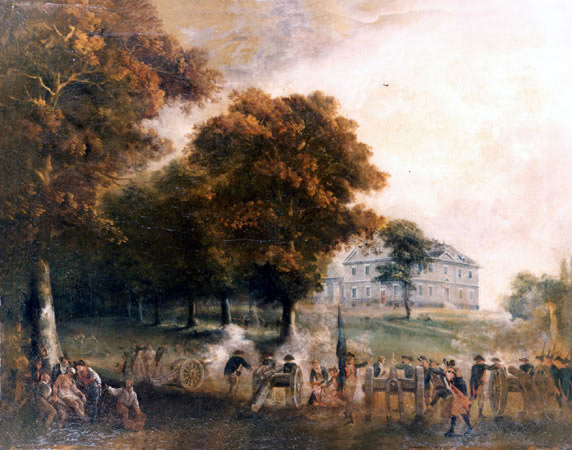
American guns fire on the Chew House at the Battle of Germantown on 4th October 1777 in the American Revolutionary War
Sullivan’s brigade was attacked on both flanks, on his left by Grant with the British 5th and 55th Regiments of Foot, and on his right by Brigadier Grey. Sullivan’s brigade broke. The British then turned on Greene’s isolated division, capturing Colonel Matthews and his 9th Virginia Regiment.
Attacked by the British Guards and the 25th and 27th Foot, Greene withdrew up the main road to the north west, assisted by the efforts of Muhlenberg’s brigade. As the American army retreated, its condition deteriorated and Washington was forced to withdraw some sixteen miles, harried by the British light dragoons.
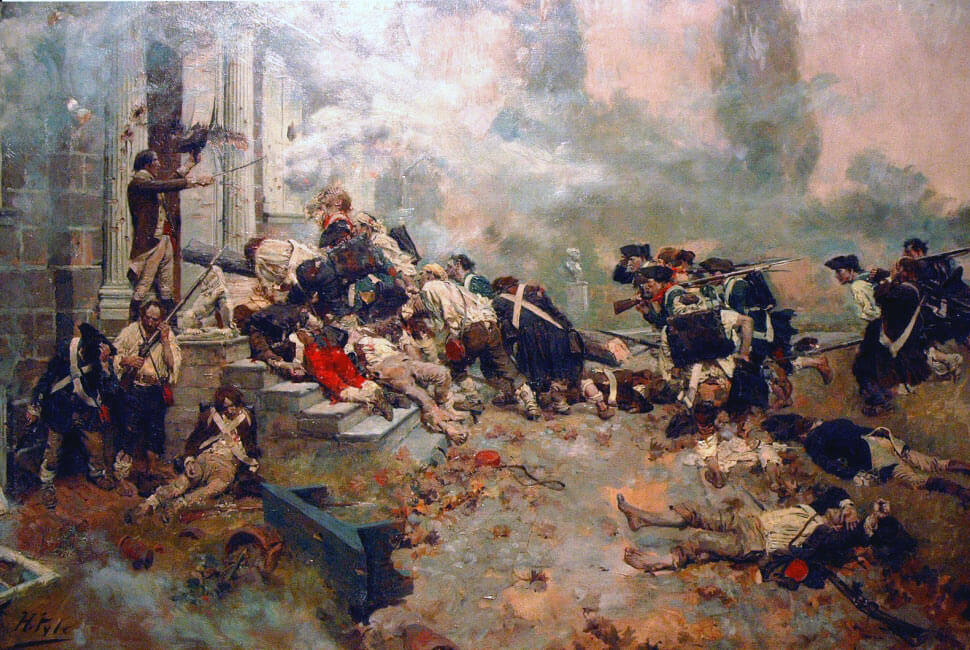
The American attack on the Chew House at the Battle of Germantown on 4th October 1777 in the American Revolutionary War
The American militia forces did not develop their attacks and finally retreated.
Casualties at the Battle of Germantown:
500 British were killed, wounded or captured in the battle. 1,000 Americans were killed, wounded or captured in the battle.
50 Americans were killed attacking the Chew House.
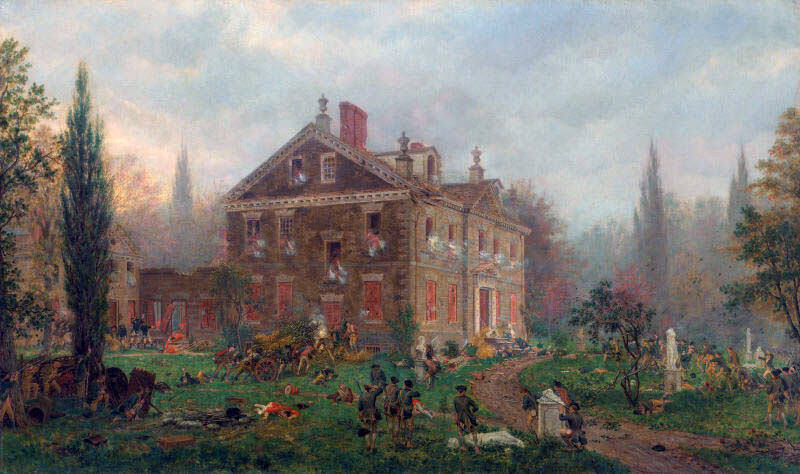
The American attack on the Chew House at the Battle of Germantown on 4th October 1777 in the American Revolutionary War: picture by Edward Lamson Henry
Follow-up to the Battle of Germantown:
It is said that the Battle of Germantown was a profound influence in convincing the French Court that the American cause was worth supporting with war on England. The French were more impressed by the ability of the Americans to raise their army and deliver an attack on the British than by its lack of success.
A noteworthy feature of the battle was the failure of the British to exploit their battlefield success by pursuing and destroying the defeated American force.
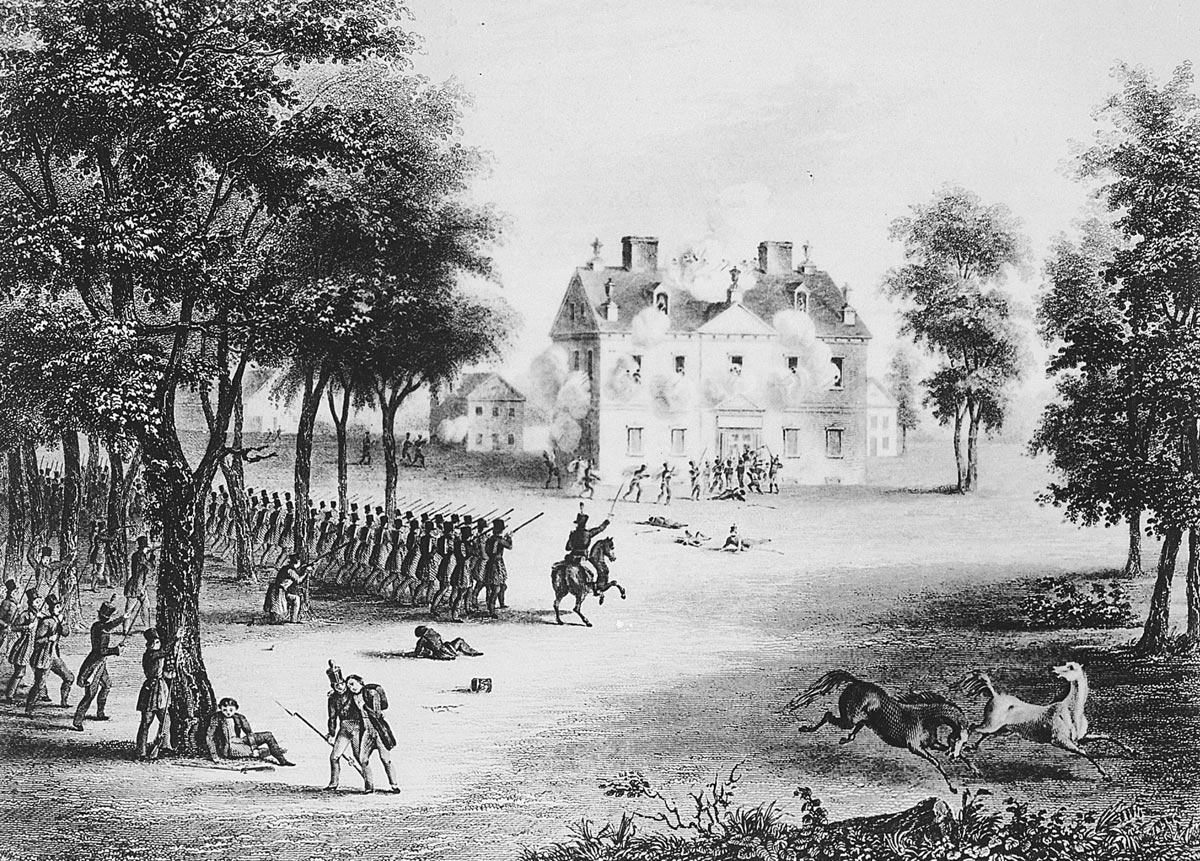
The American attack on the Chew House at the Battle of Germantown on 4th October 1777 in the American Revolutionary War (the uniforms portrayed are late 18th Century)
Anecdotes and traditions from the Battle of Germantown:

American Continental soldier: Battle of Germantown on 4th October 1777 in the American Revolutionary War
- General Stephen was discovered by the American authorities at the end of the battle incapably drunk. He was cashiered and his command given to Lafayette.
- Major-General Adam Stephen (or Steven) was another American officer who began his military career commanding a Virginian company under General Edward Braddock in 1755 (see Defeat of Braddock Part 6).
- The Americans suffered at the Battle of Germantown from the perennial difficulty of 18th Century armies to re-supply their troops. Many of the American regiments ran out of ammunition during the battle.
- General Sir George Osborn, the colonel of the 40th Regiment of Foot, caused a medal to be struck to commemorate the defence of the Chew House by the regiment at the Battle of Germantown. Silver medals were awarded to the officers and copper medals to the soldiers: an early example of a campaign medal.
- As after the Battle of Paoli, the light company soldiers of the 40th Regiment dyed their hat feathers red, on hearing of threats of vengeance from the Americans, so that the Americans would know who they were. The successors to the 40th, the South Lancashire Regiment, wore a red patch behind the cap badge to maintain the tradition.
References for the Battle of Germantown:
History of the British Army by Sir John Fortescue
The War of the Revolution by Christopher Ward
The American Revolution by Brendan Morrissey
The Philadelphia Campaign Volume II Germantown and the Roads to Valley Forge by Thomas J. McGuire
The previous battle of the American Revolutionary War is the Battle of Paoli
The next battle of the American Revolutionary War is the Battle of Saratoga
To the American Revolutionary War index
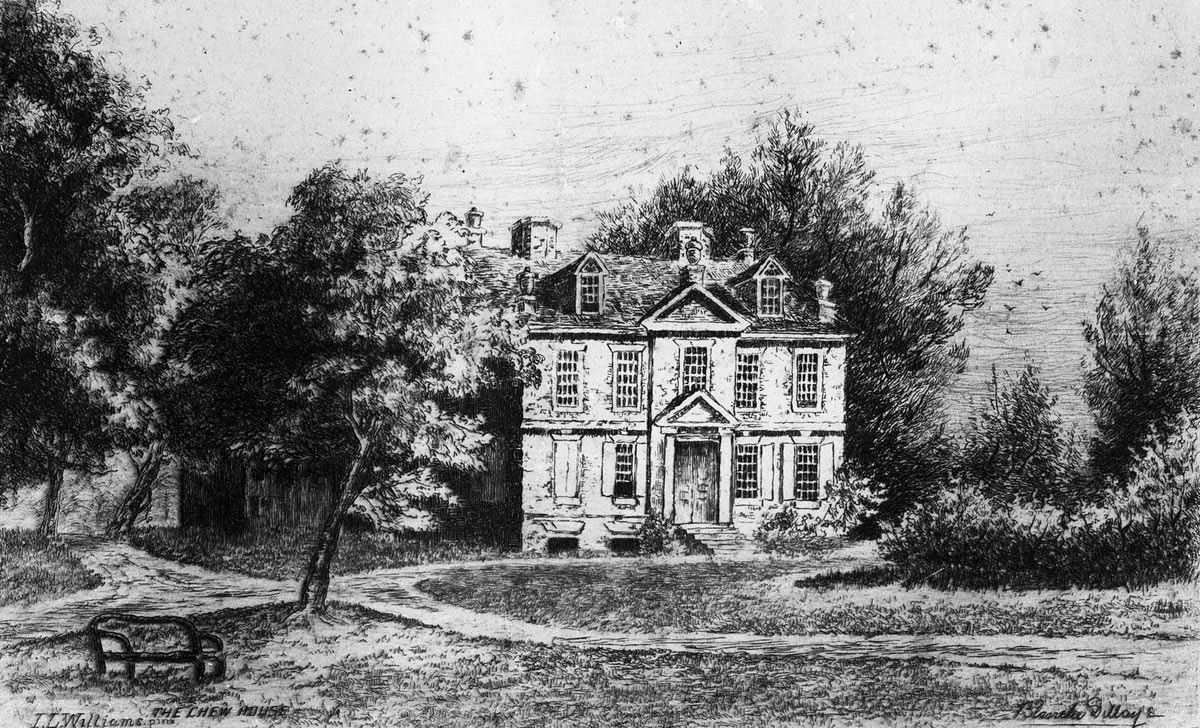
Chief Justice Chew’s Cliveden House: Battle of Germantown on 4th October 1777 in the American Revolutionary War
